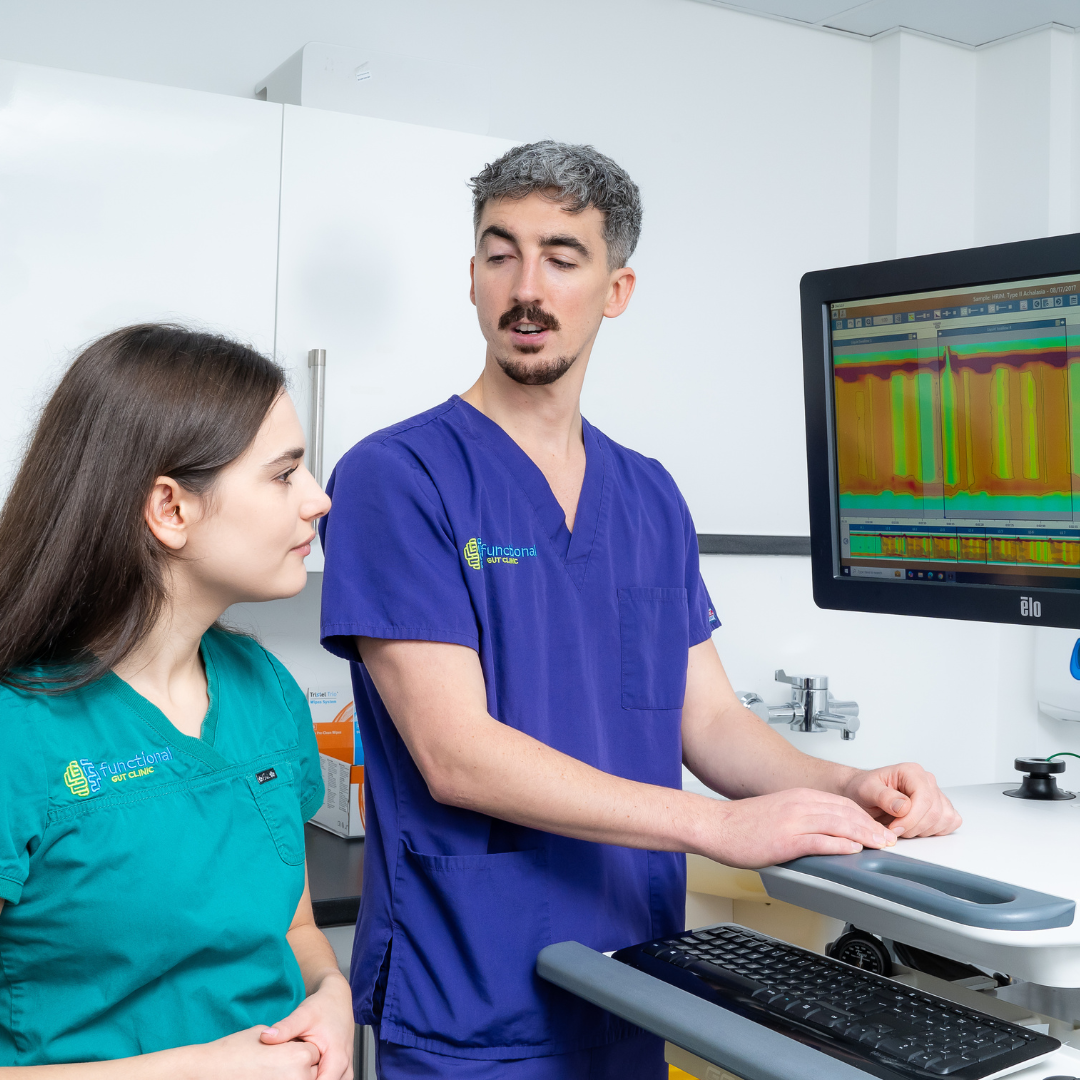Bloating
Struggling with bloating? Here’s what you need to know to find relief.
ALL TEST ARE ACCREDITED & REGULATED BY



What is bloating?
When you’re bloated, your stomach or abdomen can feel full and uncomfortable, or even painful.
This bloating happens when your gastrointestinal tract contains too much gas or air. Bloating can be mild, or more severe, and may present as:
– A visibly distended or swollen abdomen
– Feeling very full and uncomfortable
– Feeling of tightness in the abdomen
– Excess gas – belching and/or flatulence
– Rumbling or gurgling
There are several causes of bloating, so it’s important to diagnose the cause of your bloating and find out why it’s happening to you.

Why does bloating happen?
Prolonged periods of bloating could indicate an underlying health problem, if so you should see your GP.
Possible causes can include:
Irritable bowel syndrome (IBS diagnosis)
Ulcerative colitis, a form of inflammatory bowel disease (IBD), where the inner lining of the large bowel is inflamed and develops ulcers
Crohn’s disease, the other form of IBD, where some parts of your colon are inflamed
Too much bacteria in your small intestine (called small intestinal bacterial overgrowth, or SIBO)
Gastroesophageal reflux disease
Food intolerances, especially lactose or fructose intolerance
Producing too much gas (dysbiosis and fermentation)
Weight gain
Stress or anxiety
Delays in your food and drink moving on from your stomach (called gastroparesis)
Eating too quickly, so that you swallow too much air (called aerophagia)


Diagnosing bloating
Feeling bloated is no fun, but once you know what’s going on you can start to manage your symptoms and the underlying causes.
Testing options:
At the Functional Gut Clinic, we can run the following tests to diagnose the causes of bloating:
Gastric emptying test– which measures how quickly food leaves your stomach
Carbohydrate malabsorption breath test– which finds out if you have certain food intolerances (lactose or fructose)
Small intestinal bacterial overgrowth (SIBO) breath test– which finds out if you have an overgrowth of bacteria in your small intestine (called SIBO)
Oesophageal manometry– which measures the function of your oesophagus (food pipe)
24-hour pH impedance monitoring– which looks at whether you have any reflux
Colonic transit study-a non-invasive test which looks at how long it takes for faeces to pass through your bowl
Learn more about bloating

Why are the NHS still pretending SIBO doesn’t exist?
By Prof Antony Hobson, Clinical Director, The Functional Gut Clinic
Millions of people across the UK are living with chronic digestive symptoms, like bloating, cramps, diarrhoea, fatigue, and being told it’s “just IBS.” But growing evidence that up to 70% of IBS patients may actually have SIBO – or Small Intestinal Bacterial Overgrowth - a condition where bacteria migrate into the small intestine, fermenting food and producing gas, pain, unpleasant tummy symptoms and malabsorption of nutrients.
This weekend I was featured in a Mail on Sunday investigation (The little-known painful digestive problem linked to fat jabs and heartburn tablets that could affect millions – but is too often missed by GPs). It is a topic I am hugely passionate about because SIBO, it’s testable, it’s treatable, and yet NHS patients are rarely offered the breath test that could confirm it. Why?
As I explained to the journalist: “The breath test may not be perfect but it’s the best tool we have currently to diagnose SIBO. Without it, patients can’t start rifaximin which means they will never get proper treatment. So refusing to test patients is as good as just giving up on them.”
SIBO is routinely overlooked, yet it’s a very easy non-invasive that can be done at home. The test can identify the type of SIBO (hydrogen, methane, or mixed), which helps tailor treatment. It predicts treatment outcomes, especially how successful rifaximin will be. But it’s not available to most NHS patients.
Some clinicians argue the breath test isn’t accurate enough. But let’s be clear: “These are patients who are in intense pain. I often hear from people who say it feels like they are being poisoned,” I told the Mail on Sunday. “Would a respiratory specialist refuse to treat a chronic chest infection with antibiotics because this might trigger side effects? No. So why is it any different with SIBO?”
Yes, rifaximin—our go-to antibiotic—is not risk-free. But neither is leaving patients untreated. SIBO can lead to IBS-type symptoms which greatly affect quality of life, nutrient deficiencies and anaemia. The trade-offs are real, but so is the suffering if doctors do nothing.
The NHS Gap
The NHS currently lacks a standardised pathway for SIBO diagnosis and treatment. GPs are not trained to spot it. Breath testing is patchy at best. And patients are left in limbo. That’s why, until the NHS catches up, The Functional Gut Clinic processes thousands of private SIBO tests every year. Our hydrogen and methane at-home breath tests are clinically validated and interpreted by expert GI physiologists to guide targeted treatment plans. We’ve helped thousands of patients who were told “it’s all in your head.” It’s not. It’s in your gut.
We urgently need:
· National NHS access to SIBO breath testing
· GP education on SIBO symptoms and risk factors
· Clear referral pathways for testing and treatment
· Recognition that IBS is not a catch-all diagnosis
Until then, we’re here to help. If you or your patients are struggling with unexplained digestive symptoms, don’t wait. Visit our SIBO page to learn more about our testing services.
To read the full article, click here.
Hear from people we’ve helped, just like you.
"Very professional while welcoming and friendly"
"The manner and demeanour of all staff from reception to people carrying out the test was very professional but welcoming and friendly. Atmosphere is very relaxed and all instructions clear and concise."
London Patient

"Highly recommend this"
"Thanks to Dr Hobson and everyone at the Functional Gut Clinic. The whole team is very kind and generous and they are doing things that are cutting edge and they actually get results."
Manchester Patient

"Highly recommend this"
"After stopping my lansoprazole, every time I had a warm drink, I could feel it burn all the way down to my stomach. Thank you to Sam for making me feel at ease." - Manchester Patient

"My experience could not be better"
"Pleasant and knowledgeable staff that made the experience more enjoyable than it should be!" - London Patient

"Very friendly and knowledgeable"
"An excellent service from beginning to end. I would recommend to anyone who was considering having testing done. Very friendly and knowledgeable!" - Manchester Patient

"Very kind and helpful"
"It was also great to have time to talk to the clinicians – very important when you have problems. Reception staff also very kind and helpful." - Manchester Patient

Are you experiencing any other symptoms
Symptoms are often closely connected. Find out more below.
Reflux

Burning mid-chest, worse when bending or lying down
Constipation

Difficulty going to the toilet, unusual stools, often with stomach ache or intestinal cramps, bloating, nausea or appetite loss
Heartburn

A burning pain in your chest, just behind your breastbone.
The pain is often worse after eating...
Regurgitation

Bringing food or drink back up, difficulty swallowing, feeling that food or drink is stuck in your throat, horrible taste in your mouth
Swallowing Issues

Dysphagia - difficulty swallowing, feeling that food or drink is stuck in your throat, horrible taste in your mouth
Diarrhoea

Loose or explosive stools, can’t get to a toilet in time
Abdominal Pain

Cramps; sharp or dull pain, Bloating, Excessive belching, Nausea or vomiting
Faecal Incontinence

Stools leak unexpectedly, Can’t get to a toilet in time
IBS

Abdominal pain or cramping, bloating, changes in bowel habits and urgency, gas

